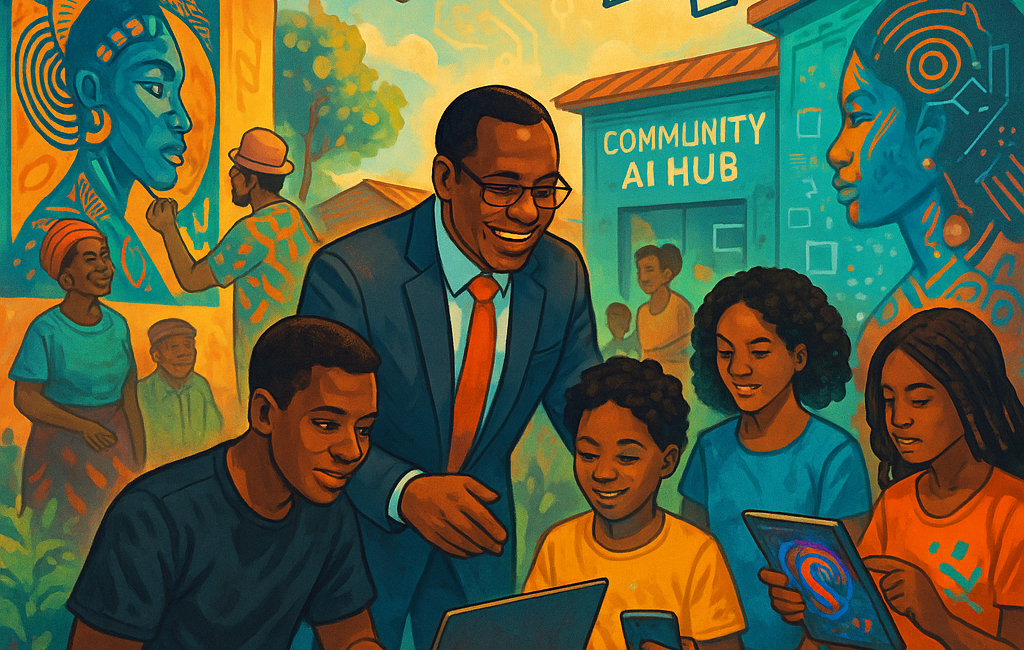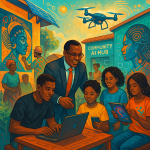As artificial intelligence (AI) continues to reshape global industries, education, healthcare, agriculture, and governance, it is imperative that we, as residents and stakeholders of Nkulumane, begin to imagine what community development could look like when guided by innovation rather than imitation. The Fourth Industrial Revolution is no longer a distant abstraction — it is here, and if communities like Nkulumane fail to proactively engage with it, we risk widening the developmental chasm between urban centers and marginalized townships.
Nkulumane, with its vibrant population, rich cultural heritage, and deep pool of youth talent, stands at a unique crossroads. On one hand, it carries the scars of decades of economic marginalization, limited access to advanced infrastructure, and high youth unemployment. On the other, it holds vast potential to leapfrog traditional development bottlenecks through AI-powered solutions.
Why AI Matters for Nkulumane
AI is not just about robots and automation; it’s about smarter ways of doing things — whether it’s using machine learning to predict disease outbreaks, utilizing AI chatbots to assist with mental health, or analyzing local economic data to better target poverty alleviation strategies. For example, imagine an AI-driven education platform that helps Nkulumane’s schoolchildren learn mathematics and science at their own pace, in their own languages. Or a mobile-based agriculture advisor that uses satellite data and AI to help backyard farmers in Nkulumane grow more food with fewer resources.
Furthermore, with Bulawayo’s strategic push for smart city initiatives, Nkulumane must not be left behind. AI can enhance service delivery — from waste management to public safety. Through predictive policing models (which must be ethically monitored), traffic regulation systems, or AI-assisted community health centers, our township can benefit from data-driven development.
The Risks of Exclusion
The biggest threat to Nkulumane is not AI itself, but exclusion from it. If our youth are not trained in digital literacy, coding, ethical AI, or data science, we will only be spectators in an AI-powered future. Jobs will be created, yes — but elsewhere. Solutions will emerge — but for others. Development will happen — but not here.
It is therefore the responsibility of policymakers, civic organizations, churches, and schools in Nkulumane to create deliberate AI awareness and training pathways. The community must demand inclusive tech hubs, lobby for AI pilot programs, and encourage public-private partnerships that prioritize digital infrastructure and youth innovation in townships.
The Role of Leadership and Vision
We need bold, visionary leadership that sees beyond potholes and broken clinics — leaders who can imagine and advocate for a future where Nkulumane youth build apps, launch startups, and contribute to solving local challenges with global technologies. Community development in the AI era demands that our leaders invest not just in roads and clinics, but in minds.
Victory Siyanqoba Trust, Nkulumane.com, and other local platforms must take the lead in fostering AI dialogue, training programs, and knowledge-sharing spaces that demystify AI for the average resident. Let Nkulumane be the blueprint for township resilience and innovation in Zimbabwe.
Conclusion: Future-Proofing Nkulumane
AI will not wait for us. It is urgent that Nkulumane positions itself not just as a recipient of development but as a co-creator of solutions. Community development must no longer be about charity or dependency; it must be about empowerment, technology, and justice. Let us future-proof Nkulumane through inclusive, ethical, and community-driven AI engagement.
The future is intelligent. The future is local. And Nkulumane must claim its seat at the table — or risk being left behind.








